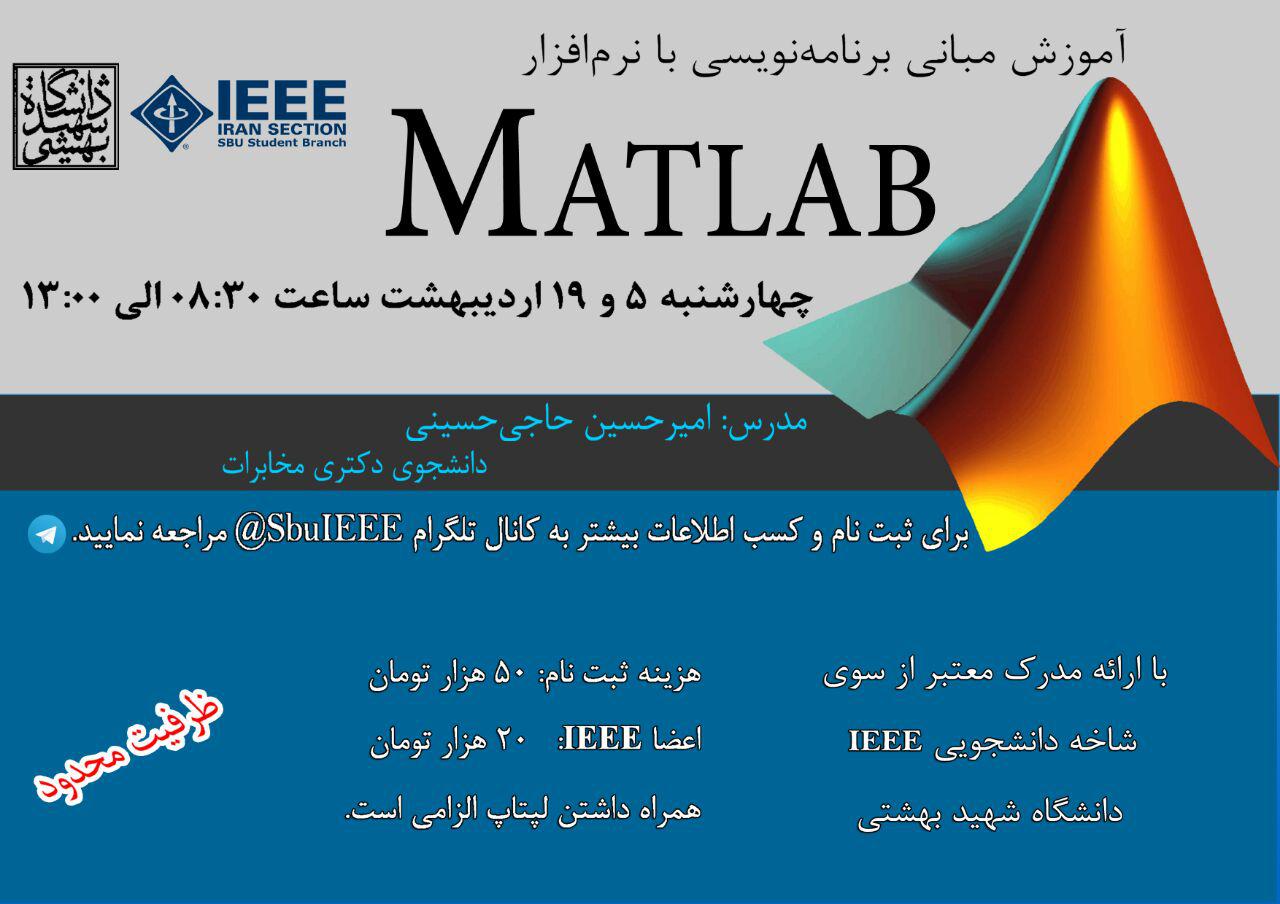شاخه دانشجویی IEEE دانشکده مهندسی برق دانشگاه شهید بهشتی برگزار می کند:

چهارشنبه پنجم و بیست و نهم اردیبهشت، آمفی تئاتر دانشکده مهندسی برق دانشگاه شهید بهشتی
شاخه دانشجویی IEEE دانشکده مهندسی برق دانشگاه شهید بهشتی برگزار می کند:

چهارشنبه پنجم و بیست و نهم اردیبهشت، آمفی تئاتر دانشکده مهندسی برق دانشگاه شهید بهشتی
Zahra Ezzati Khatab, Amirhosein Hajihoseini and Seyed Ali Ghorashi
Abstract:
Amirhosein Hajihoseini, Seyed Ali Ghorashi
Abstract:
Cognitive radio is a practical solution for spectrum scarcity. In cognitive networks, unlicensed (secondary) users should sense the spectrum before any usage, to make sure that the licensed (primary) users do not use the spectrum at that time. Due to the importance of spectrum sensing in cognitive networks, this should be fast and reliable, particularly in networks with communication link failure, which leads to network topology change. Decentralized decision making algorithms are known as a promising technique to provide reliability, scalability and adaptation, especially in sensor networks. In this paper, we propose a distributed diffusion based method in which, secondary users (sensors) cooperate to improve the performance of spectrum sensing. The proposed method provides a significant improvement in convergence rate and reliability. Simulation results indicate that the proposed algorithm shows an acceptable performance and converges twice faster than recently proposed consensus based spectrum sensing algorithms in the literature, and is almost insensitive to communication link failure.
Abstract:
Target localization is an attractive subject for modern systems that utilize different types of distributed sensors for location based services such as navigation, public transport, retail services and so on. Target localization could be performed in both centralized and decentralized manner. Due to drawbacks of centralized systems such as security and reliability issues, decentralized systems are become more desirable. In this paper, we introduce a new decentralized and cooperative target localization algorithm for wireless sensor networks. In cooperative consensus based localization, each sensor knows its own location and estimates the targets position using the ranging techniques such as received signal strength. Then, all nodes cooperate with their neighbours and share their information to reach a consensus on targets location. In our proposed algorithm, we weight the received information of neighbour nodes according to their estimated distance toward the target node. Simulation results confirm that our proposed algorithm is faster, less sensitive to targets location and improves the localization accuracy by 85% in comparison with distributed Gauss–Newton algorithm.
برای دریافت اسلایدهای آموزش مبانی نرم افزار MatLab از لینک زیر استفاده نمایید.
 برای دریافت اسلایدها اینجا کلیک کنید.
برای دریافت اسلایدها اینجا کلیک کنید.
مروری بر روش های موقعیت یابی در شبکه های حسگر بیسیم با استفاده از الگوریتم های شناسایی آماری الگو
امیرحسین حاجی حسینی، رضا شهبازیان، سیدعلی قرشی، داوود غرویان
چکیده:
استقرار یک سامانه ی موقعیت یابی برای گره های حسگر، یک مسئله ی اساسی برای بسیاری از کاربردها در شبکه های حسگر بی سیم است. از آنجا که ممکن است شبکه ی حسگر در منطقه ای غیرقابل دسترس مستقر شده باشد، ممکن است موقعیت حسگرها از قبل مشخص نباشد. بنابراین یک سامانه ی موقعیت یابی لازم است تا اطلاعات مکانی و موقعیت گره ها را در اختیار قرار دهد. در بسیاری از موارد قیمت و منابع محدود انرژی، اجازهی تجهیز تمامی حسگر ها را به سامانهی موقعیت یابی جهانی نمی دهد. لذا روش هایی لازم است تا گره ها و حسگرها بتوانند موقعیت خود را در شبکه تخمین زنند. در این مقاله سعی داریم روش های مبتنی بر الگوریتم های شناسایی آماری الگو که در زمینه ی موقعیت یابی در شبکه ی حسگر بی سیم استفاده شده اند را معرفی و عملکرد آن ها را مقایسه نماییم. با توجه به کاربردهای گسترده ای که الگوریتم های شناسایی آماری الگو دارند، این مبحث در سال های اخیر توجه زیادی را در شاخه های مختلف علوم به خود جلب کرده است و می تواند برای دستهبندی اطلاعات و شناسایی الگوی آنها به کار رود.
ارائه مقاله در هجدهمین کنفرانس ملی دانشجویی مهندسی برق ایران
موضوع: مروری بر روش های موقعیت یابی در شبکه های حسگر بی سیم با استفاده از الگوریتم های شناسایی آماری الگو
سه شنبه 26 آبان ، برج سپهر، مشهد مقدس
بعدا نوشت: این مقاله پس از ارائه در کنفرانس، به عنوان مقاله برتر گرایش مخابرات سیستم انتخاب شد.